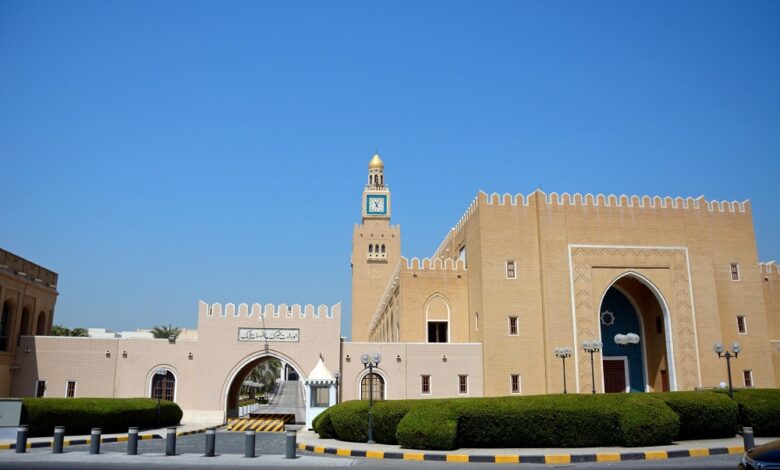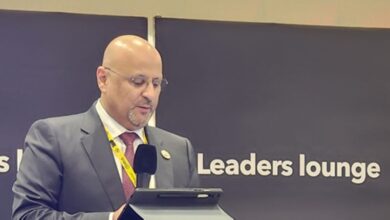Kuwait forms its 46th gov’t since ’62

His Highness the Amir Sheikh Meshal Al-Ahmad Al-Jaber Al-Sabah signed a decree Sunday approving formation of the 46th Cabinet led by Pirme Minister Sheikh Ahmad Abdullah Al-Ahmad Al-Sabah.
The first government was formed in January 1962 under reign of late Amir Sheikh Abdullah Al-Salem AlSabah.
Following is a chronology of the 44 governments formed since 1962.
Cabinets during the era of the Amir Sheikh Abdullah Al-Salem Al-Sabah: The first government, called the transitional cabinet and chaired by the late Amir Sheikh Abdullah Al-Salem Al-Sabah, was formed on January 17, 1962.
It consisted of 14 ministers, had a specific mandate for drafting a constitution, thus its tenure ended when this was accomplished on January 27, 1963.
The second government, formed on January 28, 1963, was chaired by Sheikh Sabah Al-Salem Al-Sabah and consisted of 15 ministers. It continued until December 5, 1964.
The third one, set up on December 6, 1964, was chaired by Sheikh Sabah Al-Salem, consisting of 14 ministers, four of them were MPs.
This government survived for 28 days only because it failed to win confidence of the National Assembly which considered selection of some ministers in violation of Article 131 of the constitution.
Sheikh Sabah Al-Salem chaired the fourth government that was formed on January 3, 1965, and included 13 ministers. It functioned until Amir Sheikh Abdullah Al-Salem passed away on November, triggering dissolution of government on December 3, 1965.
Cabinets during the era of the Amir Sheikh Sabah Al-Salem Al-Sabah: The fifth government, formed on December 4, 1965, was chaired by Sheikh Jaber Al-Ahmad Al-Jaber Al-Sabah. This cabinet grouped 13 ministers including three MPs.
It resigned in the end of the legislative term, February 3, 1967.
The sixth cabinet, formed on February 4, 1967, was also chaired by Sheikh Jaber Al-Ahmad. It consisted of 14 ministers including three MPs, served for four years until February 1, 1971, at end of the parliamentary legislative term.
The seventh government, which also served a full four-year term, was formed on February 2, 1971. Chaired by Sheikh Jaber Al-Ahmad, this cabinet included 13 ministers including two MPs.
Sheikh Jaber Al-Ahmad formed the following cabinet, the 8th, on February 9, 1975. The 15-member cabinet. It ended its term a month after dissolution of the parliament in August 1976.
The ninth government, formed while the parliament was dissolved on September 6, 1976, was chaired by Sheikh Jaber Al-Ahmad and consisted of 18 ministers. Its mandate ended in December 1978 after the passing away of then Amir Sheikh Sabah Al-Salem Al-Sabah. Sheikh Jaber Al-Ahmad, then Crown Prince and Prime Minister, was named as Amir.
Cabinets during the era of Amir Sheikh Jaber Al-Ahmad Al-Jaber Al-Sabah: The 10th government was formed on February 16, 1978. Then Crown Prince Sheikh Saad Al-Abdullah Al-Salem Al-Sabah chaired the cabinet. It consisted of 18 ministers and served until March third, 1981 when new elections were announced.
The 11th government, formed on March 4, 1981, was chaired by Sheikh Saad Al-Abdullah Al-Sabah, consisting of 15 ministers including one MP. It served a full four-year term up until March 2, 1982, ahead of parliamentary elections.
The 12th government was formed on March 3, 1985 and was chaired by Sheikh Saad Al-Abdullah.
The cabinet served for 16 months only due to deterioration of relations between executive and legislative authorities that led to parliament’s dissolution in 1986, triggering the government’s resignation on July 11 of this year.
The 13th government was formed on the following day and consisted of 21 ministers.
Sheikh Saad formed the 14th government with 22 ministers on June 20th, 1990. This government continued in office despite the August 2, 1990 Iraqi invasion of Kuwait, and was functioning from the Saudi City of Taef until the liberation in February 1991. It resigned on April 19, 1991.
The 15th government, the first after liberation, was dubbed the “government of reconstruction.” It was formed on April 20 of 1991 and consisted of 20 ministers. It lasted until October 16, 1992, when new parliamentary elections were held.
The 16th government, formed on October 17th, 1992, was chaired by Sheikh Saad Al-Abdullah Al-Salem AlSabah and consisted of 15 ministers including six MPs.
The 17th government was formed on October 15th, 1992. Chaired by Sheikh Saad Al-Abdullah, the government consisted of 14 ministers including four MPs. The government resigned on March 21, 1998 after a no-confidence motion was tabled against then information minister the late Sheikh Saud Nasser Al-Sabah.
The following government, the 18th, was formed by Sheikh Saad on March 22nd, 1998. It served for 15 months and resigned on July 12th, 1999, in the wake of an Amiri Decree to dissolve the parliament.
The 19th cabinet, formed on July 13 of 1999, was chaired by Sheikh Saad Al-Abdullah. The government resigned on January 29, 2001 after relations with the parliament deteriorated when former MP Hussein AlQallaf requested interpellation of Minister of Justice and Minister of Awqaf and Islamic Affairs Dr. Saad AlHashel.
However, the cabinet was formed by Sheikh Sabah Al-Ahmad Al-Jaber Al-Sabah because Sheikh Saad AlAbdullah had to leave the country for treatment. Sheikh Sabah selected 15 ministers including three MPs. This government resigned on July 13, 2003 at end of the legislative term of the National Assembly.
The 21st government was formed on July 14th, 2003, by Sheikh Sabah Al-Ahmad because the post of Crown Prince was separated from the post of Prime Minister for the first time.
This government served until February 8, 2006, despite its resignation a month earlier in the wake of passing away of Amir Sheikh Jaber Al-Ahmad Al-Jaber Al-Sabah.
Cabinets during the era of Amir Sheikh Sabah Al-Ahmad Al-Jaber Al-Sabah: The 22nd government was formed by Sheikh Nasser Mohammad Al-Ahmad Al-Sabah on February 9, 2006, and included 15 ministers and ended its mandate on July 9 because of the parliament’s dissolution.
Sheikh Nasser formed the 23rd government on July 10, 2006, and resigned on March 4, 2007 due to tension in relationship between the executive and legislative authorities. Relations reached low ebb after a grilling against Minister of Health Sheikh Ahmad Abdullah Al-Sabah, which led to a motion of no-confidence.
The 24th government was formed by Sheikh Nasser on March 25th, 2007, and resigned on May 19, 2008, in the wake of the dissolution of the National Assembly.
Sheikh Nasser formed the 25th government on May 28, 2008. However, the extremely tense relations between the legislative and executive authorities caused by an interpellation against the Prime Minister forced the government to resign on November 25, 2008.
His Highness the Amir accepted the resignation and the government continued as caretaker until January 22nd, 2009.
The 26th government was formed by Sheikh Nasser on January 23rd of the same year and resigned after four months.
The 27th government was formed by Sheikh Nasser on May 29th, 2009, and served for two years. It resigned following the growing number of interpellations.
His Highness Sheikh Nasser was reassigned, on May 8, 2011, to form the 28th government that consisted of 15 ministers including one MP. However, it resigned on November 29 of same year due to tense relations with the parliament following tabling of several grilling motions.
On December 13th, 2001, Sheikh Jaber Mubarak Al-Hamad Al-Sabah formed his first government, the country’s 29th.
This care-taker government was mandated with organizing elections and its term expired on February 13th, 2012. Sheikh Jaber Al-Mubarak formed the 30th government the following day.
However, this government was dropped because the Constitutional Court annulled parliamentary elections.
The government resigned on July 18th, 2012. The Prime Minister formed the 31st government on July 19th, 2012 with 13 ministers.
This cabinet lasted for four months due to parliament’s dissolution. The 32nd government was formed by Prime Minister Sheikh Jaber on December 11th 2012.
It served for seven months until the Constitutional Court’s annulled December 2012 parliamentary elections. Elections were held on July 27th, 2013.
The 33rd government was formed on August 4, 2013, and ministers tendered their resignations on November 28th, 2016.
The 34th government was formed on December 10, 2016 headed by Sheikh Jaber AlMubarak, consisting of 15 ministers, including one MP. The cabinet resigned on November 30, 2017.
The 35th government was formed on December 11th, 2017 under the chairmanship of Sheikh Jaber Al-Mubarak, consisting of 15 ministers, including one MP. The government resigned on November 14, 2019 after Minister of Public Works Jenan Bushehri announced her resignation following an interpellation.
The 36th government was set up on December 17th, 2019. Headed by Sheikh Sabah Khaled Al-Hamad AlSabah, it consisted of 15 ministers, including two MPs, along with the return of seven ministers from (2017 government) and the entry of three women in the new ministerial formation.
Cabinets during the era of the Amir Sheikh Nawaf Al-Ahmad Al-Jaber Al-Sabah: On December 14th, 2020, the 37th government was formed headed by Sheikh Sabah Al-Khaled and it consisted of 15 ministers. It resigned on January 18, 2021.
The 38th cabinet was formed on March 2, 2021 and was also headed by Sheikh Sabah Al-Khaled. It resigned on November 18.
Sheikh Sabah Al-Khaled formed the 39th government which included 15 ministers. His Highness the Amir accepted the government resignation on May 10, 2022.
Prime Minister Sheikh Ahmad Nawaf Al-Ahmad Al-Sabah formed the 40th government on August 1, 2022 and included 12 ministers. His Highness the Amir accepted the government resignation on October 2, 2022.
On October 6, the 41st government was formed led by prime minister Sheikh Ahmad Nawaf Al-Ahmad AlSabah, including 15 ministers and resigned in 26 January 2023.
On October 16, 2022, Prime Minister Sheikh Ahmad Nawaf Al-Ahmad formed the 42nd government consisting of 15 ministers. His Highness the Amir accepted the government resignation on January 26, 2023, assigning it to act as care-taker.
Prime Minister Sheikh Ahmad formed Kuwait’s 43rd government on April 9, 2023. His Highness the Amir accepted the government’s resignation on June 6, 2023.
Prime Minister Sheikh Ahmad formed the 44th government on June 18, 2023 and His Highness the Amir accepted its resignation on December 20, 2023.
His Highness the Prime Minister Sheikh Dr. Mohammad Sabah Al-Salem Al-Sabah formed the 45th government on January 17, 2024, and resigned following the National Assembly elections held on April 4 in accordance with Article 57 of the Constitution.
Source: KUNA













